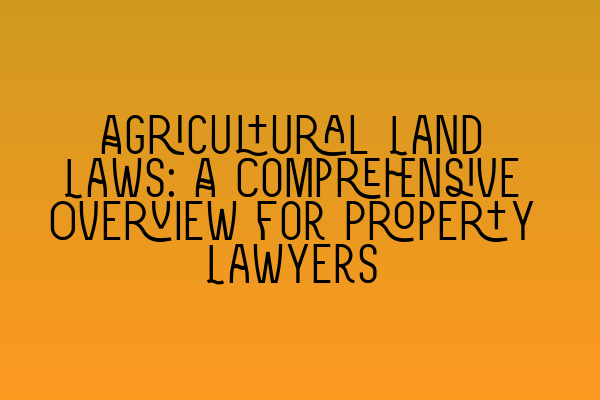Agricultural Land Laws: A Comprehensive Overview for Property Lawyers
As property lawyers, having a solid understanding of agricultural land laws is crucial to providing comprehensive legal advice to clients involved in rural property transactions. Agricultural land represents a unique subset of property law that requires specialized knowledge and expertise. In this blog post, we will delve into the key aspects of agricultural land laws that every property lawyer should be familiar with.
Definition of Agricultural Land
Agricultural land refers to land that is primarily used for farming, livestock rearing, or other agricultural activities. It is often characterized by its fertility, suitability for cultivation, and proximity to essential resources such as water sources and infrastructure. The legal definition of agricultural land may vary from jurisdiction to jurisdiction, so it is essential to familiarize yourself with the specific laws and regulations applicable in your jurisdiction.
Regulatory Framework for Agricultural Land
Various regulations govern the use and management of agricultural land. These regulations aim to protect the environment, preserve agricultural productivity, and ensure the sustainable use of natural resources. Property lawyers must be well-versed in the relevant laws, including zoning regulations, planning ordinances, and environmental protection legislation, to ensure compliance in agricultural land transactions.
One essential component of agricultural land regulations is the concept of “green belts.” Green belts are designated areas of land surrounding urban areas that have environmental and agricultural significance. These areas often enjoy legal protection to prevent urban sprawl and maintain the rural character of the countryside. Understanding the implications of green belt regulations is essential when dealing with agricultural land within these designated areas.
Key Considerations in Agricultural Land Transactions
When dealing with agricultural land transactions, there are several key considerations that property lawyers must take into account:
- Tenancy Arrangements: Agricultural land is often subject to various tenancy arrangements, such as agricultural leases or share farming agreements. Understanding the rights and obligations of both landlords and tenants in these arrangements is crucial.
- Common Agricultural Policy (CAP): In jurisdictions within the European Union, the Common Agricultural Policy plays a significant role in agricultural land regulation. Familiarize yourself with the CAP framework and its implications for agricultural land transactions.
- Restrictions on Development: Agricultural land may be subject to strict restrictions on development to preserve its agricultural character. These restrictions may limit the ability to build residential or commercial structures on the land.
- Environmental Concerns: Given the importance of environmental sustainability, property lawyers must consider any potential environmental issues associated with agricultural land transactions. These may include water rights, environmental impact assessments, or compliance with biodiversity regulations.
- Tax Considerations: Agricultural land may be subject to specific tax regimes, such as agricultural property relief or capital gains tax exemptions for farmers. Understanding these tax considerations is essential for providing accurate advice to clients.
By carefully considering these factors and conducting thorough due diligence, property lawyers can navigate the complexities of agricultural land transactions and ensure their clients’ interests are protected.
Professional Development for Property Lawyers
As property law evolves, it is crucial for property lawyers to stay updated with the latest developments and changes in agricultural land laws. Continuing professional development (CPD) courses, webinars, and seminars offer valuable opportunities to enhance knowledge and skills in this area of law.
If you are a property lawyer looking to expand your expertise in agricultural land laws, SQE Property Law & Land Law offers comprehensive SQE 1 and SQE 2 preparation courses. These courses cover all aspects of property law, including agricultural land laws, to ensure you have the knowledge and skills to excel in your practice. Explore our SQE 1 Preparation Courses and SQE 2 Preparation Courses to take your legal career to new heights.
In conclusion, understanding agricultural land laws is essential for property lawyers to effectively advise clients involved in rural property transactions. By familiarizing yourself with the regulatory framework, key considerations, and opportunities for professional development, you can become a trusted advisor in agricultural land matters. For further practice and preparation, test your knowledge with our SQE 1 Practice Exam Questions and SQE 1 Practice Mocks FLK1 FLK2. Stay informed with the latest SRA SQE Exam Dates, and be ready to excel in your legal career.
